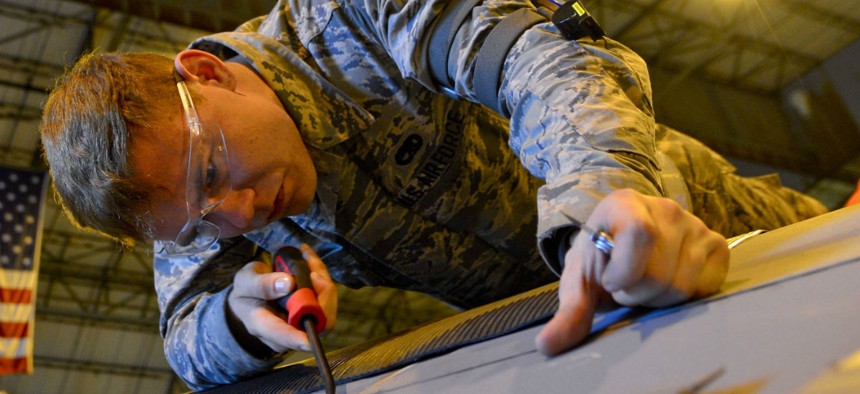
Airman 1st Class Jesse Gordon, a 436th Maintenance Squadron crew chief, works on an aircraft. Senior Airman William Johnson/USAF
Air Force Told To Save Millions on Contractors’ Depot Labor
Service acquisition chief disagrees with Pentagon watchdog recommendations.
The Air Force has not effectively negotiated depot labor profit at its logistics complex at Robins Air Base in Georgia, the Defense Department watchdog concluded, missing an opportunity to cut contractor profit and fees by $9.6 million to $24.9 million.
“Contracting officials did not adequately reduce or eliminate profit and fees paid for work performed” through a public-private partnership, said an inspector general’s report dated Feb. 8. “This occurred because program officials either did not prepare or update the business case analysis supporting the partnership type selected.”
The labor charges based on repair and maintenance affect such weapons programs as the Boeing C-17 Globemaster III heavy-lift aircraft and the AN/APN-241 high resolution radar system developed by Northrop Grumman.
The IG’s review of three out of 33 partnership repair and maintenance contracts also found that the Pentagon’s broader guidance did not require contracting officials to “assess the depot at lower risk and reduce profit and fees when it was treated differently from other subcontractors. Nor did the guidance require managers to eliminate profit and fees the contractor is paid on the depot non‑repair costs (69.3 percent to 78.4 percent of the total profit) since those expenses do not directly support the maintenance performed.
The Air Force could lower depot profit risk and reduce non-repair-related costs, auditors said. “Without a proper assessment of the partnership type and specific guidance on calculating depot labor profit, contracting officials may not consider reducing these costs in their analysis, profit values will likely remain questionable, and an opportunity to save funds will be missed.
The IG recommended that the senior contracting official at Robins Air Force Base require contracting personnel to document considerations about contractor profit or fees when depot employees perform the work, “including their reason if the depot is considered anything higher than low risk,” the report said. Contracting personnel should also determine whether the contractor should be paid profit and fees on the non-repair costs included in the depot hourly rate.
The watchdog also recommended that Air Force logistics commanders direct program offices to “prepare or update a business case analysis evaluating the costs and benefits of the partnership type to include the impact on profit and fees.”
The Pentagon’s director of Defense pricing, the IG added, “should issue guidance on the profit and fees earned on non-repair costs when the depot functions as a subcontractor.”
The Air Force disagreed with some of the IG’s interpretations. “Contracting officials assess risk factors in individual acquisitions in accordance with the DoD profit policy to establish profit objectives,” wrote acting Assistant Air Force Secretary for Acquisition Richard Lombardi. “While the DoD IG report infers depot work is always low risk, the level of risk is a case-by-case assessment addressed in the negotiation memorandum where normal (midpoint) values are not used.”
Shay Assad, director of defense pricing, concurred with the IG report, and his office is developing guidance on profit and fees a contractor can earn on non-repair costs when the work is subcontracted to a DoD depot.







